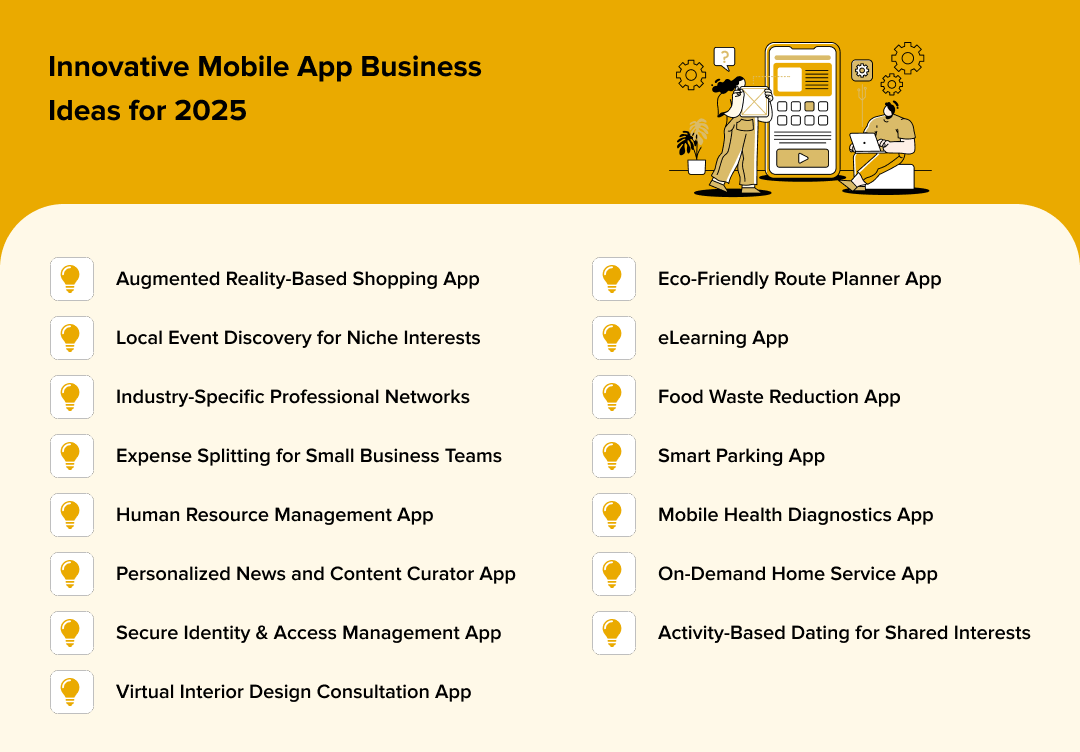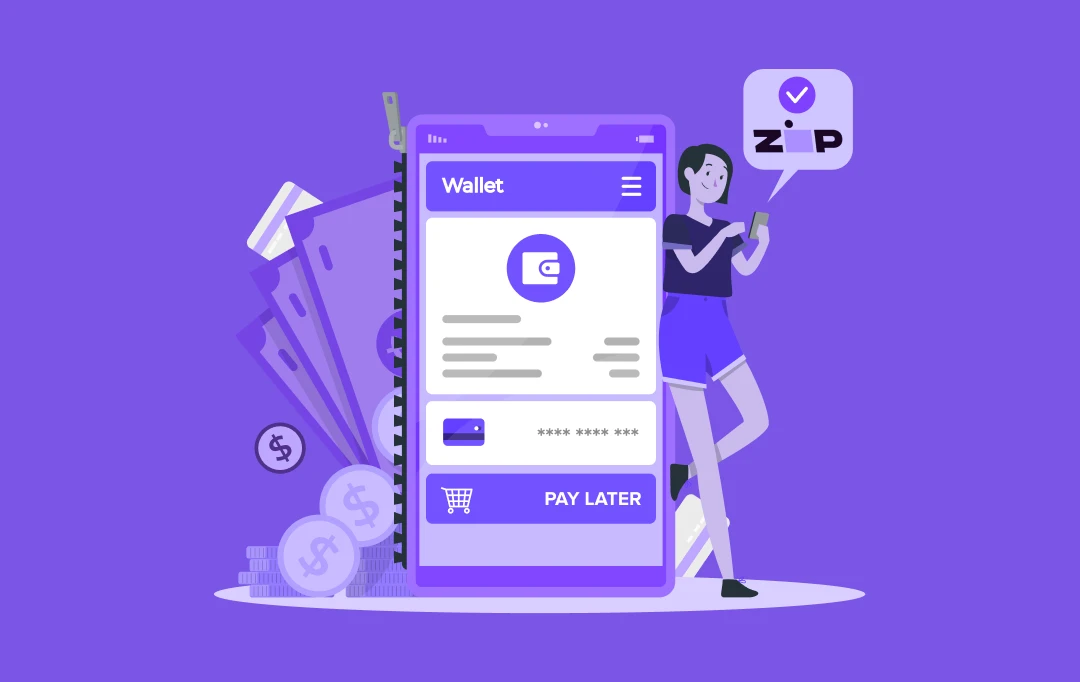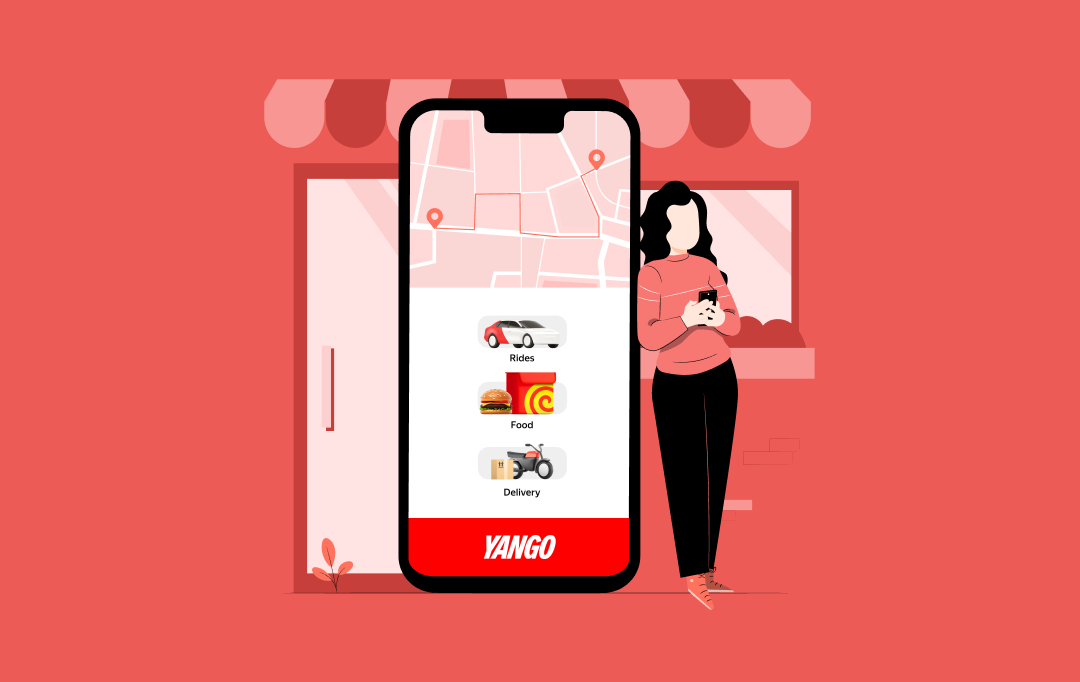Key takeaways:
- Boring Problems = Big Money: Food waste tracking and parking apps outperform social media clones. Businesses pay top dollar for solutions that eliminate daily frustrations.
- B2B Beats B2C Mostly: Business customers pay reliably for time-saving tools. Consumer apps chase viral moments; business apps solve expensive headaches.
- Charge $1 From Day One: Free users lie about loving your app. Even tiny payments reveal actual demand better than surveys and focus groups.
- Perfect One Thing First: Build one workflow flawlessly before adding features. Users forgive missing options but never forgive broken core functions
- Budget Reality: $35K-$500K Simple apps start at $35K, enterprise solutions hit $500K. Plan accordingly—wishful thinking doesn’t reduce development costs.
The Mobile Revenue Reality: Where Smart Money Flows in 2025
Most entrepreneurs chasing mobile app business ideas are solving problems that don’t exist. They’re building yet another social media clone or food delivery app while the real money flows to companies tackling unsexy problems in overlooked industries.
Why Most Mobile Apps Fail (And Where Opportunity Hides)
The average American now spends more time on mobile apps than watching TV, creating a massive attention economy worth hundreds of billions. Yet most people trying to start a mobile app business are fighting over scraps in oversaturated markets instead of finding blue ocean opportunities.
The real insight: The most profitable mobile app ideas come from identifying workflows that make people want to throw their phones against the wall. These aren’t sexy problems, but they’re lucrative ones. Companies will pay serious money for solutions that eliminate daily frustrations, streamline complex processes, or give them competitive advantages.
Let’s explore the top 15 disruptive business ideas in mobile apps that could set your company apart and dominate the market in the coming years.
What is a Mobile Business?
Your customers aren’t sitting at desks anymore. They’re making purchasing decisions during lunch breaks, comparing prices while standing in competitors’ stores, and expecting instant solutions to problems that cost them time and money. A mobile business recognizes this reality and builds operations around where people spend their time—on mobile devices.
The Pain Point Most Companies Miss
Traditional businesses lose millions because they force mobile users through desktop-designed experiences. Customers abandon cart purchases, struggle with clunky interfaces, and turn to competitors who make mobile interactions effortless. Meanwhile, companies pour marketing dollars into driving traffic to mobile experiences that frustrate rather than convert.
A mobile app for business isn’t just a nice-to-have anymore—it’s how you avoid becoming irrelevant. When your competitors force customers to pinch and zoom through websites designed for computers, you’re solving problems with dedicated mobile experiences that actually work.
Why Smart Companies Choose Mobile-First
The best mobile app business ideas address specific friction points that cost businesses real money. Take field service companies drowning in paperwork, retail chains losing sales to mobile-savvy competitors, or professional services firms struggling to stay connected with remote teams.
Companies implementing mobile app businesses are positioned to benefit. Here are some facts:
- Mobile apps account for 88% of all mobile time spent, making them the primary channel for user interaction.
- In 2025, mobile commerce is expected to make up 59% of all e-commerce sales, with transactions estimated to hit roughly $4.01 trillion.
(Design Rush: 1, 2)
The Three Mobile Business Models That Actually Work
Mobile Commerce That Converts: Forget forcing desktop shopping experiences onto phones. Profitable mobile app business ideas in commerce focus on mobile-specific behaviors—quick purchases, location-based deals, and one-thumb navigation. Companies lose 70% of mobile shoppers at checkout because their process wasn’t designed for mobile behavior.
Enterprise Mobile Applications: The biggest opportunities in ideas for mobile app business target internal operations. Field workers wasting hours on paperwork, sales teams unable to access customer data on-site, and managers lacking real-time visibility into operations. These aren’t sexy problems, but they represent massive cost centers that mobile solutions eliminate.
Specialized Service Platforms: The most successful mobile apps for business examples solve industry-specific problems. Instead of building another general-purpose app, winners target narrow problems in specific sectors—compliance tracking for healthcare, inventory management for restaurants, or client communication for professional services.
Your Mobile Business Strategy Starts With One Question
What expensive, time-consuming process is your industry still handling manually? That’s where profitable mobile app business ideas begin. Companies succeed when they stop thinking about mobile as a marketing channel and start treating it as a tool for operational efficiency and customer problem-solving.
15 Disruptive Mobile App Business Ideas for Consideration in 2025
In 2025, the mobile landscape continues to offer fertile ground for innovative mobile app ideas that can disrupt traditional markets and consumer behaviors. Here are ten mobile app business examples poised to make a significant impact, providing fresh opportunities for growth and transformation in various industries.

Augmented Reality-Based Shopping App
This concept involves integrating augmented reality technology into ecommerce applications, enabling users to visualize products in their environment before purchasing. For example, customers can see how a piece of furniture would look in their living room or how a dress might fit.
- Business Advantage: Increases consumer confidence, boosting conversion rates and reducing product returns. It provides a competitive edge by enhancing user engagement and interaction.
- Cost Range: $50,000 – $200,000
- Revenue Model: Generate revenue through transaction fees, premium feature subscriptions, and partnerships with retailers offering AR experiences.
Check Case Study: Adidas eCommerce App
On-Demand Home Service App
Offering an on-demand home services app is one of the mobile app ideas that can help your business get maximum RoI. This mobile platform connects users with service providers for immediate home services such as plumbing, cleaning, and handyman tasks. The app allows users to book services online, providing quick, reliable, and quality home solutions.
- Business Advantage: Fulfills the growing demand for instant and reliable home services, improving customer satisfaction and loyalty. Provides steady work for service providers, creating a robust service ecosystem.
- Cost Range: $60,000 – $150,000
- Revenue Model: Earnings through service fees collected from providers, subscription plans for premium user features, and targeted advertising within the app.
Check Case Study: Ikea Shopping App
Mobile Health Diagnostics App
To start a mobile app business, businesses can develop an application that leverages AI to offer preliminary health diagnostics based on user symptoms and inputs. For these mobile app startup ideas, integration with wearable technology could enhance functionality, providing real-time health monitoring and alerts.
- Business Advantage: Increases accessibility to healthcare advice, particularly in underserved areas, and facilitates early detection of health issues. Builds strong partnerships with healthcare providers.
- Cost Range: $100,000 – $300,000
- Revenue Model: Monetize through consultation service fees, subscription models for advanced features, and partnerships with medical institutions.
Check Case Study: Dr. Reddy’s eLearning Platform
Eco-Friendly Route Planner App
A navigation app is one of the leading online mobile app business ideas in 2025 that businesses can realize in this digital yet environmentally conscious era. It not only provides directions but also suggests the most eco-friendly routes. It could integrate public transportation and carpooling options and mean times to travel when traffic is lightest to reduce emissions.
- Business Advantage: Attracts environmentally conscious users and supports urban planning efforts. It can be marketed to governments and ecologically focused organizations as part of their green initiatives.
- Cost Range: $40,000 – $120,000
- Revenue Model: Revenue through in-app advertising, partnerships with environmental organizations, and potential government funding for supporting sustainable urban development.
One particularly impactful concept is the development of an intelligent travel companion; for details on how to build an AI trip planner app, consider its features for personalized itineraries and real-time recommendations.
Check Case Study: Moo eScooter App
Human Resource Management App
A robust mobile app for businesses to streamline their HR operations, including employee tracking, payroll management, benefits management, and compliance with labor laws is another one of the leading profitable mobile app business ideas 2025. This tool enhances HR workflows, improving efficiency and reducing the administrative burden on HR teams.
- Business Advantage: Leverages the increasing need for efficient HR management solutions, offering a comprehensive platform that simplifies complex HR tasks and improves staff satisfaction and retention.
- Cost Range: $100,000 – $500,000
- Revenue Model: Subscription-based access to advanced HR tools, tiered pricing for different organizational sizes, and optional add-ons for specialized services like recruitment and performance analytics.
Check Case Study: Social Networking App
Smart Parking App
Utilizing IoT technology to develop an app that helps users find and reserve parking spaces in real-time is one of the smartest mobile app startup ideas to make money. This app can capture a significant market by syncing with municipal parking systems to show real-time availability and enable mobile payments.
- Business Advantage: Solves parking issues in crowded cities, improves traffic flow, and reduces pollution from cars searching for parking. Offers a scalable solution that can expand to different markets.
- Cost Range: $150,000 – $400,000
- Revenue Model: Fees per transaction, monthly subscriptions for premium features, and partnerships with municipal parking authorities and private lot owners.
Check Case Study: Driver Assistant App
eLearning App
An app that provides personalized educational content tailored to the individual’s learning pace and style. It uses AI to adapt the learning path based on the user’s progress and preferences. This is one of the major mobile app ideas to make money that businesses can seek in the future.
- Business Advantage: Meets the increasing demand for personalized learning experiences and continuous education, with the potential to scale globally across multiple educational fields.
- Cost Range: $100,000 – $350,000
- Revenue Model: Subscription fees for users, sale of licensed educational content, and certification fees for completed courses.
Check Case Study: Nova Education App
Virtual Interior Design Consultation App
This app combines AI and AR to help users design and visualize changes to their home or office spaces before committing to real-world alterations. Users can experiment with different furniture, wall colors, and layouts.
- Business Advantage: Appeals to the DIY market and those looking to make informed decisions about home improvements. Partnerships with home improvement stores could enhance user engagement and drive sales.
- Cost Range: $70,000 – $200,000
- Revenue Model: Affiliate commissions, in-app purchases for premium design features, and partnerships with furniture and home decor brands.
Check Case Study: Real Estate App
Secure Identity & Access Management App
A fully-fledged mobile application that integrates blockchain technology to provide a secure, comprehensive identity and access management solution. This app is designed to serve as a central hub for managing digital identities, facilitating secure logins, online transactions, digital signatures, and physical access controls. By leveraging blockchain, it ensures that all identity data is encrypted and immutable, offering unmatched security and privacy.
- Business Advantage: Offers businesses a reliable and secure way to manage identities, reducing the risks of data breaches and identity theft. This app is particularly valuable in sectors requiring high security, such as banking, healthcare, and government services.
- Cost Range: $200,000 – $500,000
- Revenue Model: Revenue is generated through enterprise licensing fees, per-transaction charges for identity verifications, and premium subscriptions for enhanced security features and integrations with other business systems.
Personalized News and Content Curator App
Renowned as a profitable mobile app business idea, businesses can develop an app that uses sophisticated AI algorithms to learn about user preferences and deliver a tailored feed of news and content. This is one of the mobile app business examples that would analyze a user’s reading habits to optimize the content mix, ensuring high engagement.
- Business Advantage: Keeps users informed and engaged while providing advertisers with targeted opportunities based on user interest profiles. Enhances user stickiness and ad revenue potential.
- Cost Range: $40,000 – $150,000
- Revenue Model: Advertising revenue based on user engagement, subscriptions for an ad-free experience, and data analytics services for content providers.
Check Case Study: Social Ecosystem Empowering App
Food Waste Reduction App
Restaurant managers throw away $1,600 worth of food monthly because they can’t track inventory properly. This app connects restaurants with surplus food to local charities, food banks, and budget-conscious consumers before items expire. Users scan barcodes to log inventory, get expiration alerts, and instantly list excess food for pickup.
- Business Advantage: Solves two problems simultaneously—restaurants cut waste costs while communities access affordable fresh food. Local governments increasingly mandate food waste reporting, creating regulatory demand.
- Cost Range: $40,000 – $120,000
- Revenue Model: Transaction fees from food sales, subscription plans for restaurant inventory management, and partnerships with waste reduction consultants who need tracking data for compliance reporting.
Check Case Study: Food Delivery App
Expense Splitting for Small Business Teams
Freelancers and small business owners waste hours every month splitting shared expenses like software subscriptions, office supplies, and client dinners. This app automatically divides costs based on usage data, revenue percentage, or custom rules. It integrates with business bank accounts and sends payment requests directly to team members.
- Business Advantage: Targets the 32 million small businesses struggling with expense management. Unlike personal splitting apps, this focuses on tax-deductible business expenses and integrates with accounting software.
- Cost Range: $50,000 – $140,000
- Revenue Model: Monthly subscription fees per business user, transaction fees on automated payments, and partnerships with accounting software providers who need better expense allocation tools.
Check Case Study: Financial Literacy App
Industry-Specific Professional Networks
LinkedIn works for general networking, but plumbers can’t find other plumbers, and restaurant owners struggle to connect with suppliers. This app creates focused communities for specific trades and industries. Users share job opportunities, vendor recommendations, and industry-specific advice without generic business content cluttering their feeds.
- Business Advantage: Higher engagement rates than broad platforms because content stays relevant. Industries like construction, hospitality, and healthcare have strong professional communities but lack dedicated digital spaces.
- Cost Range: $45,000 – $130,000
- Revenue Model: Premium memberships for enhanced networking features, job posting fees from employers, and commission from vendor marketplace transactions between community members.
Check Case Study: Social Media App
Local Event Discovery for Niche Interests
People who love jazz, board games, or poetry readings can’t easily find local events that match their specific interests. This app uses location data and interest profiles to surface small venue events that mainstream platforms ignore. Users RSVP, get reminders, and connect with others attending the same events.
- Business Advantage: Small venues and event organizers struggle with marketing reach. This solves discovery for niche events while helping venues fill seats consistently.
- Cost Range: $35,000 – $110,000
- Revenue Model: Ticketing fees for paid events, promoted event listings for venues, and partnerships with local businesses wanting to sponsor niche community gatherings.
Activity-Based Dating for Shared Interests
Traditional dating apps focus on photos and profiles, but people connect better through shared activities. This app matches users based on mutual interests like hiking, cooking classes, or museum visits, then suggests actual activities to do together as first dates. Users plan dates around hobbies they already enjoy.
- Business Advantage: Higher success rates because matches start with a common ground and planned activities. Reduces the awkwardness of first dates while creating revenue opportunities through activity partnerships.
- Cost Range: $55,000 – $150,000
- Revenue Model: Premium subscriptions for unlimited activity suggestions, commission from partner businesses (restaurants, entertainment venues), and fees for organizing group dating events around specific interests.
After looking into the best future business ideas for mobile apps, let us now move ahead and understand how you can convert these mobile app business opportunities into successful ventures.
From Concept to Market: Launching Your Mobile Business Idea
Most mobile app ideas die in spreadsheets and brainstorming sessions. The difference between successful mobile businesses and failed concepts isn’t the quality of the idea—it’s execution discipline. Here’s how to actually bring profitable mobile app business ideas 2025 to market without burning through your budget or missing critical deadlines.
The Reality Check Phase
Stop Building Until You Answer These Questions
Before writing a single line of code, successful entrepreneurs validate three fundamentals that kill 80% of mobile businesses before launch:
Who specifically will pay for this solution? “Busy professionals” isn’t specific enough. “Insurance adjusters who spend 3+ hours daily on claim documentation” gives you someone to call and interview.
What’s the exact pain point costing them money? Vague problems create vague solutions. Quantify the problem: “Manual inventory tracking costs restaurant managers 8 hours weekly and leads to $2,400 monthly food waste.”
Why can’t they solve this with existing tools? If current solutions work adequately, you’re building a vitamin, not a painkiller. Find the specific gaps that force people into expensive workarounds.
Building Your MVP the Right Way
Start Brutally Simple
The most successful mobile apps for business examples started with embarrassingly basic versions. Focus on one core workflow that users complete repeatedly. Everything else is feature creep.
Your MVP should solve one specific problem completely rather than solve five problems partially. Users forgive missing features but never forgive broken core functionality.
Test With Real Money
Free beta users lie. They’ll tell you the app is “great” while never using it again. Charge something—even $1—to find users who actually value what you’re building. Payment validates demand better than any survey.
Revenue Model Reality
Pick Based on User Behavior, Not Industry Trends
Subscription models work when users need ongoing value (daily/weekly usage). One-time purchases work for project-based tools. Freemium works when network effects drive adoption.
Don’t choose a revenue model because competitors use it. Choose based on how your specific users actually want to pay. Interview 20 potential customers about their current spending on similar solutions.
Development Partner Selection
Look for Business Understanding, Not Just Technical Skills
The best development teams ask about your business model before discussing technology. They should challenge your assumptions and suggest alternatives based on market realities, not just implement what you request.
Red flags: Teams that promise everything, avoid discussing timelines, or focus solely on features without questioning business logic.
Green flags: Teams that ask tough questions about monetization, suggest starting smaller than you planned, and have experience in your industry’s specific challenges.
Launch Strategy That Actually Works
Start With 100 Perfect Users
Better to have 100 users who can’t live without your app than 10,000 users who tried it once. Focus on finding and obsessing over your first power users. They’ll tell you what features actually matter and become your best marketing channel.
Launch in phases: first to solve the core problem, then to add convenience features, finally to scale. Most failed apps try to do everything at launch and end up doing nothing well.
Measure What Predicts Revenue
Track user actions that correlate with payment: time spent in key workflows, frequency of return visits, and completion rates for your core value proposition. Downloads and sessions are vanity metrics that don’t predict business success.
Common Execution Mistakes That Kill Mobile Businesses
Building for yourself instead of customers. Your preferences don’t matter—customer behavior does.
Launching too late because you want “one more feature.” Perfect is the enemy of profitable.
Choosing technology based on what’s interesting rather than what’s practical for your specific requirements.
Underestimating ongoing costs. Budget for marketing, customer support, and continuous development—not just initial build costs.
The mobile businesses thriving in 2025 didn’t start with the most innovative ideas. They started with specific problems, validated demand early, and executed methodically. Your idea’s brilliance matters less than your ability to bring it to market efficiently and iterate based on real user feedback.
Why Appinventiv is the Right Development Partner for Starting a Disruptive Mobile Business
We hope this blog has sparked some exciting ideas for your venture into the mobile business world. Realizing such innovative concepts isn’t just about having a great idea but also about finding the right partner who truly understands your vision and can turn it into reality.
At Appinventiv, we pride ourselves on being more than just a development firm that can help you convert your mobile app entrepreneurship ideas into reality. We are your innovation partner, here to guide and support you at every step of the journey. Here’s why we believe we are the perfect mobile application development services firm for bringing your disruptive mobile app to life:
- Always Ahead of the Curve: Our experts thrive on innovation. We are constantly exploring and adopting the latest technologies to ensure that your app isn’t just current but ahead of its time. Whether integrating AR to enhance user interaction or utilizing AI for smarter processes, we guarantee your app stands out.
- Deep Dive into Your Industry: We don’t just build apps for your business; we craft tailored solutions that address specific market challenges and opportunities. Our team invests time to understand your industry’s nuances, enabling us to develop an app that’s functional and perfectly aligned with market demands and future growth.
- With You for the Long Haul: From understanding your mobile app business ideas to launching your app is just the beginning of what we hope will be a long and successful journey. From ongoing maintenance to iterative updates based on user feedback, we stay by your side, ensuring your app continues to perform and impress long after it hits the market.
- From Vision to Success: Our portfolio speaks volumes about our ability to turn ambitious ideas into successful apps. We have partnered with startups and established brands, transforming their diverse visions into apps delivering value and a superior user experience.
- Your Vision, Our Mission: We believe the best creations come from collaborative efforts. When you work with Appinventiv, you gain a genuinely interested team in your project’s success. We listen, discuss, and contribute proactively, ensuring that every decision is in your app’s best interest and its future.
Contact us to make your dream app a reality, blending your innovative ideas with our technological expertise and market insights.
FAQs
Q. What are the advantages of starting a mobile app business?
A. Starting a mobile app business offers significant advantages for companies looking to expand their reach. Mobile apps provide direct access to a global customer base, enabling scalable growth. They allow businesses to collect valuable consumer data, improving decision-making and effectively tailoring marketing strategies.
Additionally, mobile apps enhance operational efficiency by automating key processes and interactions, reducing costs while improving service quality. The flexibility of mobile platforms also means businesses can quickly adapt to market changes, maintaining a competitive edge.
Q. What mobile app business is most profitable?
A. Among the most profitable mobile app business ideas are augmented reality (AR) shopping experiences, on-demand services, and mobile health diagnostics. AR shopping apps attract users with immersive experiences that allow them to visualize products in their own space before purchasing, often leading to higher conversion rates and user engagement.
On-demand services apps cater to immediate needs like home repairs, beauty services, or personal fitness, providing convenience that users are willing to pay for and are the leading business opportunities in the mobile app ecosystem.
Mobile health diagnostics apps, which offer users health-related services and advice directly on their phones, are also some of the innovative ideas in the mobile app ecosystem that are gaining traction due to their convenience and the increasing focus on health and wellness.
Q. What is the cost and timeline to develop a mobile app business?
A. The cost to develop a mobile app business can range significantly, generally between $40,000 and $500,000, depending on the app’s complexity, feature set, and design requirements. For instance, simple apps with basic functionality might be developed within a few months at the lower end of the cost spectrum, while more sophisticated apps involving technologies like augmented reality, blockchain, or advanced data analytics could take up to a year or more and cost towards the higher end.
To convert your mobile app niche business ideas into reality, partnering with a firm that can offer expert guidance and robust development services is essential. Such a partnership ensures that your app is not only developed within the estimated time and budget but also is equipped with the necessary features and innovations to stand out in the market.
Product Development & Engineering
IT Managed & Outsourcing
Consulting Services
Data Services
Didn't find what you're looking for? Let us know your needs, and we'll tailor a solution just for you.



























